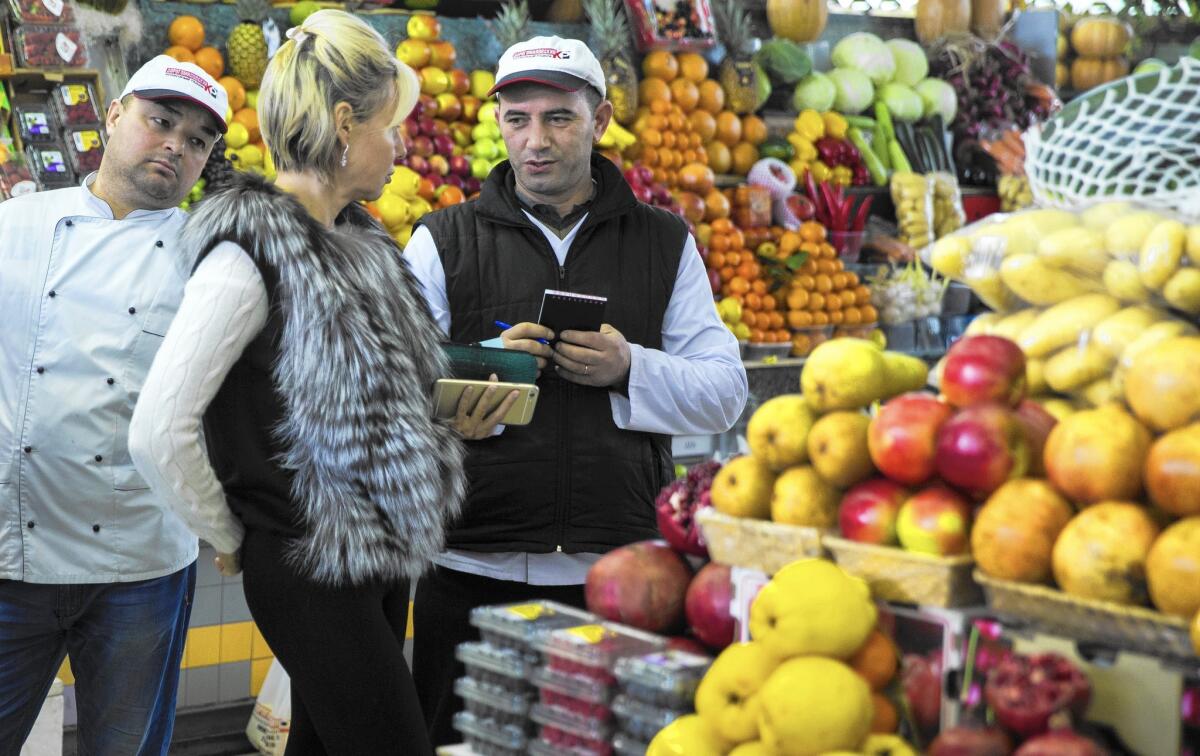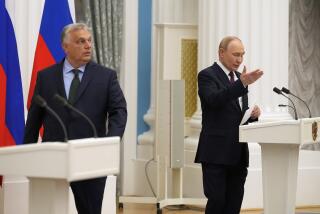Putin appeals to Southern European countries for EU sanctions relief

Reporting from MOSCOW — Russian President Vladimir Putin has been campaigning for sanctions relief from traditionally friendly Southern European countries in what appears to be a strategy of dividing the European Union and undermining its alliance with the United States.
Moscow responded to last year’s U.S. and European Union sanctions over the Ukraine crisis with a ban of its own on food imports from the 28-nation economic bloc.
Since mid-February, though, Putin has met with leaders of four European Union countries and urged them to act independently in their relations with Russia so that their mutually beneficial food trade can resume.
The blockade has deprived Russians of some of the meats, dairy products, fruits and other produce they had become accustomed to seeing on their supermarket shelves since the days of Soviet-era shortages became a distant memory. But the import ban has inflicted as much, if not more, pain on major food exporters to Russia such as Italy, Greece, Cyprus and Hungary.
The Russian Customs Service reported Friday that imports have dropped by 37% this year as the country struggles with a currency that has lost half its value mostly because of the sanctions and falling oil prices.
European foreign ministers met Friday in Riga, the Latvian capital, to review the sanctions regime and consider whether to revise or extend it, a decision to be made before a summit on March 19 and 20.
U.S. and European Union countries have imposed visa restrictions on top Russian politicians and businesspeople and frozen the foreign assets of those they consider complicit in Russia’s seizure of Ukraine’s Crimea region a year ago. They also accuse Moscow of backing separatists in eastern Ukraine, where about 6,000 people, many civilians, have been killed since April.
Putin first made the call for European leaders to think for themselves during a Feb. 17 meeting with Hungarian Prime Minister Viktor Orban in Budapest, his first official reception in an EU capital in more than eight months.
About 2,000 Hungarians protested the visit and their government’s warming ties with the Kremlin, although the public opposition abated after Orban announced that he had cut deals to ensure Russian natural gas supplies and for a major upgrade of Hungary’s antiquated nuclear energy complex.
Over the last week, Kremlin officials disclosed that they were looking for ways to exempt Greece, where a leftist party took power after January elections, from the food import ban announced in August.
Russian Economic Development Minister Alexei Ulyukayev said Athens had relayed a request for resumption of fruit exports to Russia during to a visit by a senior Agriculture Ministry official last month.
Greece in recent years exported to Russia 20,000 tons of strawberries and up to 60,000 tons of peaches, Russia’s FruitNews trade publication reports. Since the ban on food imports, Greek exports to Russia have declined by 40%, according to Russia’s RIA Novosti news agency.
Greek Deputy Agriculture Minister Panagiotis Sguridis said he had been told Russian officials were exploring ways to exempt his nation from their ban.
Greece and Russia have long had close political and cultural ties, and share the Orthodox religion. The leftist government of Greek Prime Minister Alexis Tsipras also shares much of the Kremlin’s skepticism about European Union economic assimilation, which for Greece has meant harsh austerity measures in exchange for bailouts.
Russia, though heavily dependent on the Western alliance for food and manufactured goods, nonetheless resents the bloc’s competition for preferential trade with Ukraine. Putin wanted Ukraine to join his Eurasian Economic Union, which unites former Soviet republics in a counterpoint to the alliance governed from Brussels.
It was former Ukrainian President Viktor Yanukovich’s attempt to scuttle an association agreement with the European Union in 2013 that sparked the rebellion that drove him from office and provoked the war racking Ukraine.
If Moscow accords favorable treatment to Greece in agricultural trade, that is likely to exacerbate tension between Athens and Brussels and weaken European unity on the sanctions issue.
Putin also hosted Cypriot President Nicos Anastasiades in late February and Italian Prime Minister Matteo Renzi on Thursday, rare official visits to Moscow since the sanctions were imposed.
Putin warned the Cypriot leader that the EU risked its “competitive advantages” by engaging in mutually destructive sanctions with Russia, intimating that the punishment is at least partly motivated by U.S. exporters trying to horn in on Europe’s markets.
Renzi’s visit to the Kremlin was said to be aimed at discussing the Ukraine crisis, as well as Italian-Russian trade ties. Through last year, Italy was Russia’s No. 4 source of imports, and Putin praised Rome as a “privileged partner” when greeting Renzi at the Kremlin.
The Italian government leader preceded his visit with a stop in Kiev to meet with Ukrainian President Petro Poroshenko and he began his stay in Moscow by paying respects to slain opposition leader Boris Y. Nemtsov at the flower-strewn site of his Feb. 27 assassination near the Kremlin.
During his talks with Putin, Renzi called on the Kremlin to respect Ukraine’s territorial integrity and to adhere to the terms of a Feb. 12 peace plan for the embattled neighbor.
There was no word of any change in the food export standoff, but Renzi’s visit was nevertheless portrayed by Russian state-run television as a sign of Italy’s straying from European Union solidarity on sanctions.
Twitter: @cjwilliamslat
More to Read
Sign up for Essential California
The most important California stories and recommendations in your inbox every morning.
You may occasionally receive promotional content from the Los Angeles Times.











